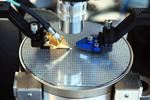Other
“Researchers from Lancaster University in the UK have discovered how superfluid helium 3He would feel if you could put your hand into it. The interface between the exotic world of quantum physics and classical physics of the human experience is …
“ULTRARAM™, a novel type of memory with extraordinary properties, is be showcased for the first time at the world’s largest independent storage and memory event. The Flash Memory Summit at the Santa Clara Convention Center in California from August …
“Lancaster University has won a £1.3M award for research into quantum turbulence. The funding from the EPSRC is for a four-year project entitled “Creation and evolution of quantum turbulence in novel geometries”. The research team is led by Professor …
News Whirlpools with the symmetries of squares and tetrahedrons observed in an exotic quantum superfluid
“A team of physicists have created and observed an entirely new class of vortices – tiny and exotic whirlpools - in an ultracold gas of atoms which produce ‘beyond state-of-the-art’ symmetries. The international collaboration of researchers is led by Professor David Hall …
“Scientists have created the first ”time-crystal” two-body system in an experiment that seems to bend the laws of physics. It comes after the same team recently witnessed the first interaction of the new phase of matter. Time crystals were long …
“A Lancaster physicist has proposed a radical solution to the question of how a charged particle, such as an electron, responds to its own electromagnetic field. This question has challenged physicists for over 100 years but mathematical physicist Dr Jonathan …
News Mass production of revolutionary computer memory moves closer with ULTRARAM™ on silicon wafers for the first time

“A pioneering type of patented computer memory known as ULTRARAM™ has been demonstrated on silicon wafers in what is a major step towards its large-scale manufacture. ULTRARAM™ is a novel type of memory with extraordinary properties. It combines the non-volatility …
“Researchers from Imperial College London and Lancaster University have suggested a new approach to test the limits of applicability of quantum mechanics. Quantum physics has long provided humanity with an elegant framework for understanding the microscopic world. However, quantum phenomena …
“Computer scientists from Lancaster University have developed new AI technology that takes autonomous cars a step closer to our roads. Funded by global car manufacturer Ford, the three-year research project provides a step-change in AI car technology by enabling autonomous …
“Physicists created and detected Skyrmions after they constructed a topological model of these elusive fundamental particles in a light beam. Professor Janne Ruostekoski from Lancaster University collaborated with researchers from the University of Birmingham, Riken in Japan and Muenster in …

